KACANIKU/KACANIK, Kosovo - Beyond the outskirts of this city's busy main
street, smaller villages dot the towering mountainous terrain surrounding
the municipality. Narrow roads wind cautiously up the sides of the tree
covered mountains to rural homes and villages, near the border with the
Former Yugoslavian Republic of Macedonia.
This is where U.S. KFOR Soldier Staff Sgt. Andrew T. Gilbertson, Oakes,
N.D., has found his place as a middleman in a cross-continental exchange
program between students in Kosovo and his native North Dakota.
An educator in his civilian life, Gilbertson said the village schools felt
like familiar ground to him when he arrived here in late October 2009, as
part of the U.S. Kosovo Forces (KFOR) 12 rotation.
Gilbertson is a NATO peacekeeper, part of Multinational Battle Group East's
Liaison Monitoring Team (LMT) 6, which works with local communities to
pinpoint problems and facilitate solutions.
"I started working with the schools for two reasons, the first being I am a
teacher and felt at home talking to other educators and students."
Gilbertson said. "Second, in some of the villages I worked with, the schools
were where the problem-solvers in the village worked."
Gilbertson has worked with students and staff in six schools during his time
in the Kacaniku/Kacanik municipality, which includes Ivaja /Ivaje,
Kotlina/Kotline, Globocica/Gllobocice, Bicevac/Bicec, Djurdjev
Dol/Gjurgjedell, and Laniste/Llanishte. He said working in the schools
helped him do his job, which is sensing the concerns of the citizens and
knowing what was going on in the municipality.
Gilbertson said he first thought of starting an exchange of letters between
the students - like a pen pal program. After talking to educators back in
Oakes, specifically Larry Engel, the technology support advisor of Oakes
School, a more modern idea was proposed.
"We thought it would be a good idea to take it one step further and
videotape the schools and students here, which teachers in Oakes would show
to the students there," Gilbertson said. "The students in Oakes then made a
video themselves that we showed to the students in Kosovo. It was more of a
visual cultural exchange and the students in both the U.S. and Kosovo gained
a better understanding of each other's daily life."
Gilbertson gave examples of the effort put forth by the students in Kosovo.
"In Bicec (Bicevac) they had students singing a cappella, in English, as
part of their presentation and in Kotlina (Kotline) they did a whole play,
which took time to organize," Gilbertson said. "Everyone was 100 percent on
board between the U.S. and Kosovo."
"I think the communication between schools all came about because of
(Gilbertson) and his dedication to teaching and educating young minds,"
Engel said. "He wanted there to be a way for students from such different
cultures to be able to communicate and share."
Over time, the relationship between the schools grew and blossomed. After
learning more about the needs of the Kosovo municipality and the students,
students and faculty in Oakes decided to take on a bigger project.
"It was an amazing experience, yet humbling, as we saw what the Kacanik
municipality was doing with what they have," Engel said. "Oakes had at least
nine teachers that were meeting with (Gilbertson) via Skype and discussing
the sharing of cultures, then the idea was brought up to gather supplies for
the students in Kosovo."
Don Warren, Oakes principal, felt this would be a good undertaking for the
Student Council. The council, headed by Oakes student Max Kettlering,
gathered donations by leaving boxes in classrooms and around the school for
students to drop off school supplies.
"We ended up with six boxes and when we took them to the post office, we
were overwhelmed with a cost of over $800 to ship them to one of the
humanitarian aid agencies in Kosovo," Engel said.
As luck would have it, U.S. Sen. Bryon Dorgan (N.D.) was headed to the
region and, after the school staff contacted his office, he offered to take
the boxes to Germany if the school would send the boxes to his senate
office.
"We had one last hurdle, raising $155 to send the boxes to Washington,
D.C.," Engel said. "Oakes has a family support group for the families of
Soldiers who serve in Afghanistan, Iraq and Kosovo. They volunteered to pay
the entire amount of the postage and the boxes were off."
Once in Kosovo, Gilbertson handed off the boxes to Naim Hysa,
Kacaniku/Kacanik Red Cross director, who happily distributed the donated
school supplies. In early June over a span of two days, Hysa and Arlend
Hysa, youth leader of Kacaniku/Kacanik Red Cross, with the help of youth
volunteers Domjeta Tromi and Erona Thaqi, drove their truck up and around
the dry and bumpy mountain roads of the municipality, delivering one box to
each of the six village schools.
"I think that this small project grew and was successful because a lot of
people worked hard to make it happen," Gilbertson said, thinking back on all
the meetings between teachers and students in the U.S. and Kosovo.
Gilbertson, in reflecting on the success his time in Kosovo has brought,
said "I think at the end of the day the students are the ones who benefited
and the world got just a little bit smaller because of this project."
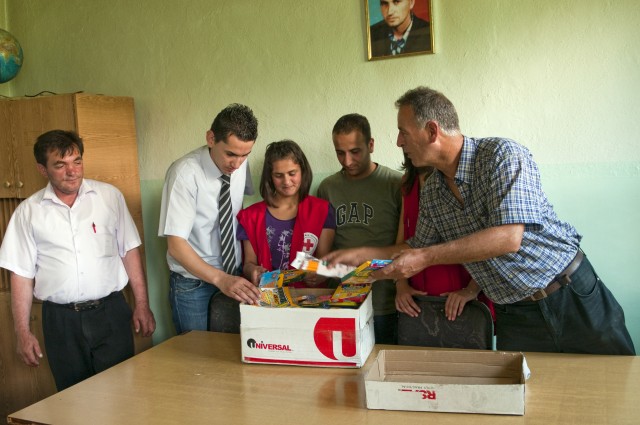
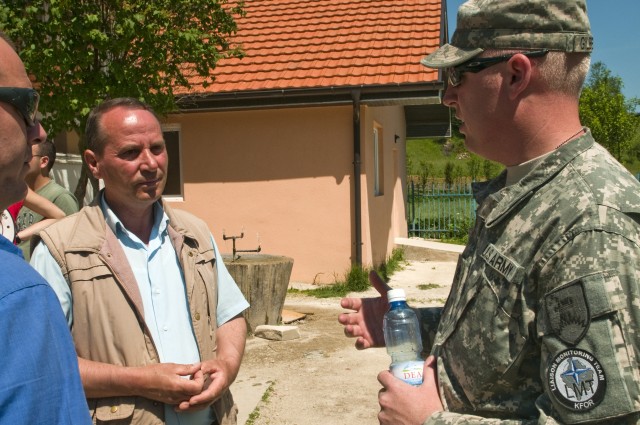
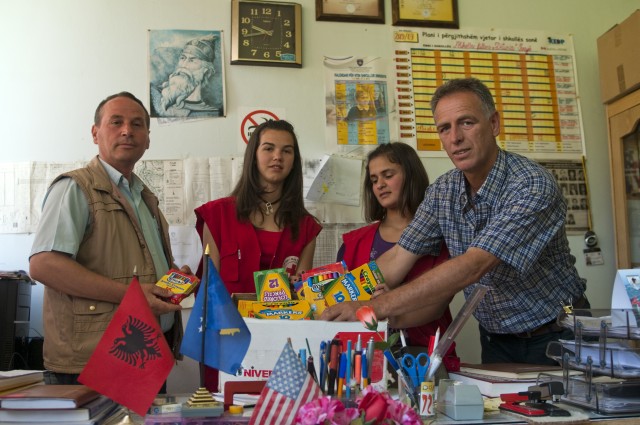
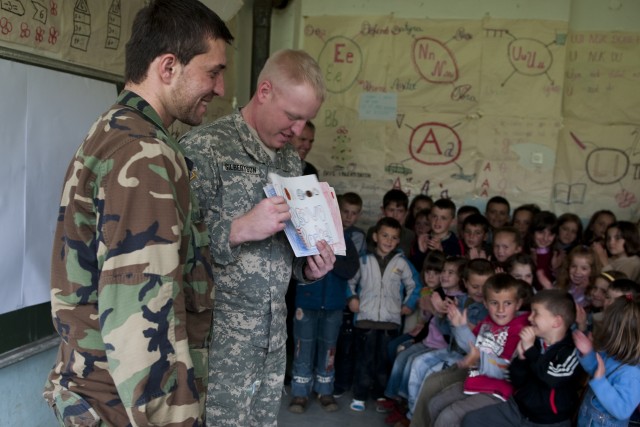



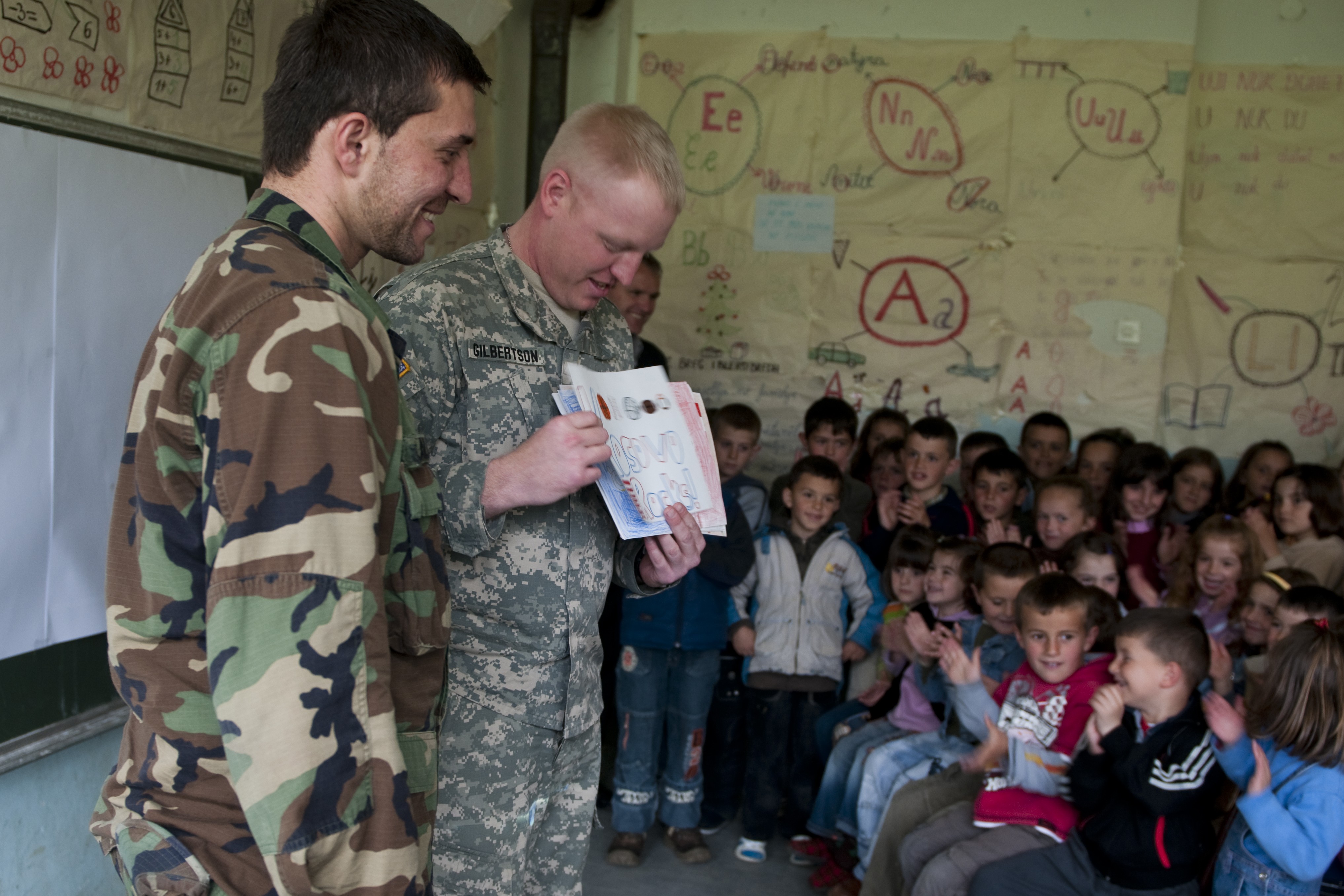
Social Sharing